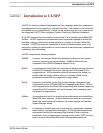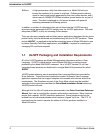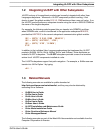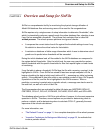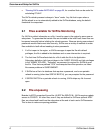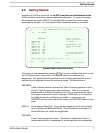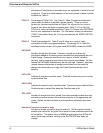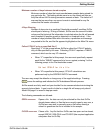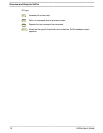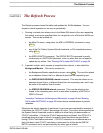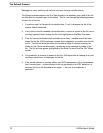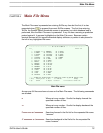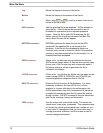——————————————————————————————————————————
Overview and Setup for SirFile
——————————————————————————————————————————
placement of new pointers in the table must run repeatedly in order to find an
empty slot. There is no fixed measure of how many retries indicate a critical
condition for Table C.
CFULLP Percentage of Table C full. Like Table A, Table C begins to exhibit hash
retries when the data in it reaches a certain density. There is no strict
formula for the maximum fullness of Table C for a given file, but a rule of
thumb is that retries will begin to appear when Table C is 70 to 80% full.
CFULLP is a more accurate measure of Table C full status than CRETRIES,
but it is very expensive to calculate. For this reason, unless you determine
CFULLP calculation file-by-file, it is only calculated by the SIRFILE BATCH
command.
DFULLP Table D percentage full. Table D can fill either as a result of index
information or User Language procedures. Percentage full in Table D is
calculated as the number of D pages used (DPGUSED) divided by DSIZE.
EXTNADD
Number of Extension Records. Extension records occur when the
information added to an existing record exceeds the usable space left on a
Table B page. Extension records are not a sign of a file full condition
pending, and in some record structures they may be unavoidable. For this
reason the EXTNADD threshold may be set very high. However, extension
records cause inefficiencies in storage and retrieval, and for some file
designs should be taken as a sign that Table B parameters are out of
balance.
OVFLADD
Addition of records to overflow areas. Overflow records may occur in either
sorted or hash files.
EOVFLADD
Addition of records to extra overflow areas. Records may be added to Extra
Overflow areas in sorted files when the Overflow area is full.
SPILLADD
Number of records that have “spilled” from the preferred overflow area into
secondary overflow areas or the overflow area prior to the appropriate sort
group. Spilled records are stored and retrieved less efficiently than other
records.
Number of historical records to keep
Number of sample records to keep for each file. SirFile requires at least 1
sample to be stored for any given file in order to make predictions about file-
full conditions. The default value of 99999 records means that SirFile will
never throw away old data, as long as the file CREATE date does not
change.
——————————————————————————————————————————
8 SirFile User's Guide




